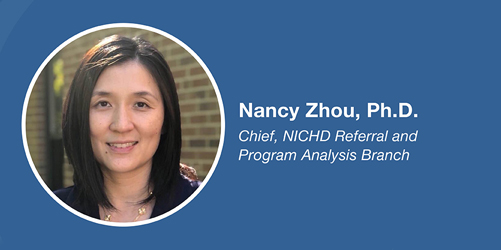 What do you do at NICHD?
What do you do at NICHD?
I’m the chief of the Referral and Program Analysis Branch (RPAB) at NICHD. Our main goal is to ensure the science NICHD funds is succinctly categorized and represented, empowering the institute to make data-driven decisions.
For example, RPAB supports and advances the institute’s scientific mission by providing accurate program analyses and interpretation and classification of the scientific interests of all research projects. We also develop and update scientific coding to track and monitor NICHD’s research portfolio (grants, contracts, and intramural projects) over time.
What types of training, experiences, or traits are essential for success in your position?
I’ve worked in private, consulting, and government industries for more than 15 years. Those experiences gave me invaluable training and insight that I’ve used to tackle challenges and engage with a wide range of people and teams.
To excel within the scientific program analysis field at NIH, it’s imperative to have a high level of data literacy. This entails effectively reading, analyzing, and communicating data using current and emerging technologies. You need a comprehensive skill set and the ability to identify trends and insights within extensive datasets, as well as the aptitude to translate findings into compelling narratives.
I’ve encountered analysts who excel at generating visually appealing trend graphs, yet they have difficulty distilling the key message. In our increasingly data-centric world, organizations rely heavily on data to make informed decisions and drive favorable outcomes, so the ability to transform complex data into a cohesive and impactful story is essential.
What do you find most valuable about working at NICHD?
I started at NICHD a little more than a year ago, and from day one the senior leadership has emphasized NICHD’s goal of modernizing our current scientific coding process, telling a story through portfolio analysis, and understanding the gaps we’re trying to fill scientifically. Given the rapid evolution of technology, the time sensitivity of achieving this goal has increased significantly.
What I truly appreciate about working at NICHD is the opportunity to make a tangible difference and empower our institute to make informed decisions based on data. My responsibility to modernize, streamline, and enhance scientific coding and analysis will ultimately have a profound impact on our institute.
Describe a project or task that you are especially proud of accomplishing.
I take great pride in my team’s ongoing development of a dashboard. While it is currently in the beta testing phase, I consider it a noteworthy accomplishment.
The goal of this dashboard is to provide NICHD program staff with the ability to quickly access curated data on NICHD’s Child Health Information Retrieval Program (CHIRP) data and grants portfolio. Ultimately, this tool will help reduce administrative burden and automate the reporting of data NICHD uses to make decisions, including success rates, funding mechanisms and awards trends.
Has your career followed a path you originally envisioned, or have there been unexpected changes or detours in the path? How did you navigate them?
Both of my undergraduate degrees were in chemical engineering, so initially I envisioned a career path focused solely on engineering. Thanks to the rigorous analytical training I received during my studies, I applied these skills to a range of roles across private, consulting, and government sectors.
Transitioning from one job to another can be challenging, and venturing into different industries adds an extra layer of complexity. Throughout my career, I have been fortunate enough to have strong mentors by my side. As a woman in a technical field, these mentors have served as role models, advocates, advisors, and allies in my professional life. Over time, as I became a more experienced leader, my passion for mentoring and fostering the growth of individuals on my team flourished. I attribute much of my success to these mentors who guided me through various career milestones, and I am determined to extend the same support to my community, particularly in advancing women in the fields of science and technology.
What advice can you offer to people who are at an earlier stage of their career?
My top three:
- Take initiative. Be open to taking on additional projects that can expand your skillset and provide exposure to various aspects of your job early on in your career.
- Seek a mentor. While having supportive managers who prioritize your career development isn't always guaranteed, take the initiative to find a mentor or multiple mentors with whom you can connect. These mentors will play a crucial role in guiding you through challenging situations and providing valuable advice.
- Be humble. Recognize that you'll be working alongside colleagues who possess expertise in their respective fields. Maintain an open mindset and embrace a continuous learning approach. Use their expertise to enhance your own skills and knowledge, ensuring that you can continue the cycle of knowledge-sharing when you become an expert in the future.
Return to Get to Know NICHD.
 BACK TO TOP
BACK TO TOP